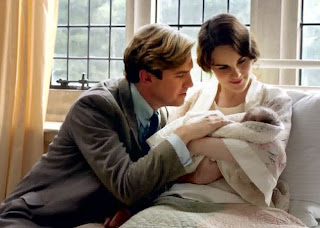After receiving an HMV gift voucher for Christmas from my aunt and uncle, I decided that I would replenish my period drama collection (not the 'coolest' thing I've ever done, but then I'm not really) and first on my list was the 2009 BBC adaptation of Jane Austen's 'Emma'.
 The basic plot of 'Emma' is this: "Emma Woodhouse, beautiful, clever, and rich, has very little to concern her. When her governess marries advantageously, Emma congratulates herself on her great success as a matchmaker. So, when she meets the pretty, naive, and socially inferior Harriet, Emma is ready to practise her skills again - ignoring warnings of the harm she could cause from friend and neighbour, Mr Knightley.
The basic plot of 'Emma' is this: "Emma Woodhouse, beautiful, clever, and rich, has very little to concern her. When her governess marries advantageously, Emma congratulates herself on her great success as a matchmaker. So, when she meets the pretty, naive, and socially inferior Harriet, Emma is ready to practise her skills again - ignoring warnings of the harm she could cause from friend and neighbour, Mr Knightley.
As she sets about meddling with the affairs of the village of Highbury, Emma carves a trail of confusion, disappointment and disaster that risks Harriet’s happiness, and much to her surprise, her own happiness too. As our heroine embarks on a journey that challenges her naivety and her social preconceptions it leads her to realise that she has become so focused on the lives of others that she has failed to see what’s in front of her own eyes.." (Amazon)
Since buying it yesterday, I've watched this 4-hour-long mini-series twice the whole way through, and it's brilliant. I just love it. Although, in general, I'm not much of an Austen fan - I can't abide the book 'Pride and Prejudice', although I enjoyed the 1995 Colin Firth adaptation, and I found 'Sense and Sensibility' really quite boring. However, after watching this version of 'Emma', I'm strongly considering giving the book a go.
One of the greatest things about this adaptation is that it's absolutely hilarious. The humour is subtle in places and more obvious in others, providing a nice mix which makes it watchable for all. Mostly, the comic moments are making fun of the society of Austen's time and so what makes it funnier is that the characters in the series aren't supposed to know that they're being made fun of.
Another factor that I loved about this adaptation was the almost constant presence of beautiful men in this series. Mr Knightly, Mr Elton and Frank Churchill all completely make the series for me, and the parts are so brilliantly acted. Jonny Lee Miller as Knightly was particularly brilliant and basically I'm going to spend my life waiting for my very own Mr Knightly, as much of a long shot as that is. The dancing scene (shown below) is just complete perfection and the tiny adjustments of facial expressions from both Miller and Romola Garai (playing Emma) say so much. The music in the scene is also absolutely beautiful, and the whole scene put together never fails to make me smile and cheer me up when I'm feeling down.
Emma's hypochondriac father is played in this series by the fantastic Michael Gambon (from Harry Potter). However, it was odd at times to hear the fearless Dumbledore worrying about who might catch a cold if they went to the seaside. I suppose this added to the comedy in some ways and was a testament to Gambon's ability to act diverse characters.
If I had to find a problem with this series - it's hard to find one - I did find the ending a little contradictory as, one moment Harriet is proclaiming her love for one man, and the next she has completely forgotten him and marries another man, whom she, only a few minutes before, said she could never contemplate being with. I'm not sure if this is a fault in the book, or simply a problem of lack of time in the series resulting in cuts having to be made and stories not being explained as well as they could have been. Either way, this doesn't really detract that much from the story as the ending is so beautiful. I just love it.
I will admit though, this story is quite 'girly' since it's a romance and I'm not sure if many men would be that keen on it - at least they probably would't admit to liking it. But, for me, this is pretty much as good as period drama gets and it was absolutely fantastic; I would recommend it to any of my friends, and the series has the ability to cheer you up, even when you're feeling at your lowest. 9/10.



















